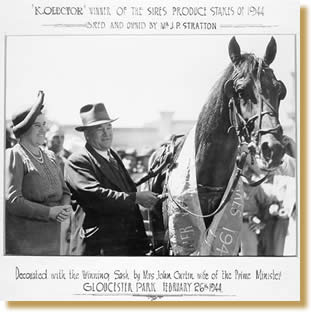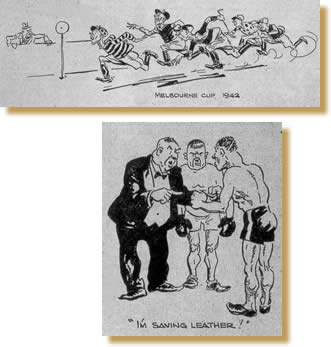
During the war John Curtin was not totally opposed to sport itself. In fact he encouraged some sports as being good for fitness. [38] Yet Australia's main sporting pursuits - football, cricket and horse racing - were indeed curtailed during that period. Mobilisation meant that all resources, human and material, were needed for the war effort.
The State Governments, rather than the Federal Government, were responsible for determining whether or not sporting competitions like football and cricket continued because of their knowledge of local conditions.
Many football and cricketing identities joined the services and in Victoria some clubs couldn't field complete teams. In 1942 eleven teams played over a sixteen weeks program. [39] Some grounds, including the home of cricket and football in Australia - the MCG (Melbourne Cricket Ground), were taken over for service camps, depots or essential services. The Western Australia Football League restricted football to those under 18 years of age from August 1942 until the end of the war. [40]
Match attendances were also down, with part of the population away fighting the war and another part working on the war effort at weekends. Restrictions on travel related to security and petrol rationing also resulted in lower attendances.
During the war, austerity measures meant nearly all commodities, including boots and race books became rationed. Even club trophies were banned and the money contributed to war funds. [41] However, Curtin recognised that the people, himself included, needed some form of recreation during tough times, and sports, including racing, provided this even given the restrictions they faced.
John Curtin was interested in horse racing, sharing this sporting passion of many Australians. He was known to admire good horsemanship and be interested in the breeding aspects of producing winners. His knowledge of the history of great Australian horse races was formidable. Upon meeting a new member of the press in Canberra, Joan de Mestre, he asked whether she was related to the de Mestre who owned Archer, the horse that won the first two Melbourne Cups in 1861 and 1862. She was indeed de Mestre's granddaughter. [42]
The Melbourne Cup, Australia's premier horse race, is traditionally held on the first Tuesday in November and is 'the day the nation stops'. Despite cutbacks, the famous race continued to be held. In fact in 1941, Cabinet paused its meeting at 3pm to hear the radio broadcast of the race. John Curtin was reported to have picked the three Western Australian horses, Yodvara, True Flight and Maikai for that race. [43] Skipton won, Son of Aurous and Beau Vite, second and third. The three West Australian horses were unplaced. [44]
Despite his sympathy with Australians' need for relaxation, John Curtin did object on one occasion when, after appealing to the people for the need for restraint in spending, two race meetings were held in Melbourne on one day. [45] Following this, race clubs were called upon to economise, both in the frequency of meetings and in the number of races held per meeting and in the facilities provided. Departing with tradition the Melbourne Cup was held on Saturdays. Radio broadcasts of the races were restricted. Punters who bet large sums with the bookmakers particularly irked Curtin because they showed such a lack of team spirit towards the country:
PUT
MONEY ON AUSTRALIA
Mr. Curtin's Tip to Racegoers
CANBERRA,
Monday. - "Most of the punters at Randwick and Flemington on Saturday
would have done better to have backed Australia than the horses they apparently
backed," the Prime Minister, Mr Curtin declared to-day.
Mr Curtin said he would very much have liked the money wagered at the
two racecourses to have been devoted to the Fourth Liberty Loan.
"The record investments on the totalisators and the huge turnover
with the bookmakers reveal that many men and women were employed as clerks,"
Mr Curtin continued. "They thereby prolonged the kind of avocation
they followed during the week, instead of resting, and were less fit to
do their work the following week, because they provided for other people
recreational and betting facilities."
"I understand also that many punters pulled rolls of notes out of their pockets, which reveals at once why the note issue has gone up. The man who is reported to have pulled five £100 notes from his pocket to put on a horse is a thoughtless enemy of his country. That is putting it mildly. [46]

| Australians' love of sport didn't always happily co-exist with them 'giving their all' to the war effort as Ted Scorfield points out in this 1941 cartoon 'The Dinkum Game'. Images from 'The Dinkum Game' - Cartoon by Ted Scorfield in the Bulletin, 14 May 1941 |

| On one occasion, the Prime Minister's wife, Mrs Elsie Curtin, presented the winner's sash to the successful horse in the Sires Produce Stakes of 1944 JCPML. Records of the Curtin family. 'Kollector' winner of the Sires Produce Stakes of 1944 being decorated with winner's sash by Mrs John Curtin, 26 February 1944. JCPML00376/158 |

| Going without in wartime was not without its lighter side as these images from Ted Scorfield's 1942 cartoon reveal - 'Melbourne Cup 1942' and 'I'm saving leather!'. Images from 'Enter Austerity' - Cartoon by Ted Scorfield in the Bulletin, 2 September 1942 |
Despite his interest in the track, Curtin continued through the war to criticise the excesses associated with racing saying 'the pageantry of racing is left in full stride.' [47]
John Curtin was very conscious of the losses and sacrifices being made by the rest of the country and in particular service personnel who were paying the ultimate price for their country. In a speech he made at Albert Hall in Canberra he spoke of the loss of the son of the Governor General Lord and Lady Gowrie, Patrick Hore-Ruthven.
'We cannot measure the cost of this terrible war in money and material things. I doubt if there can be any spiritual assessment of the loss. I am certain that just as many a Bradman of the future has lost the chance of development, … .' [48]